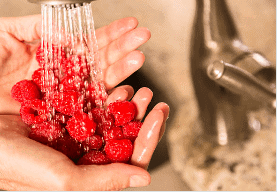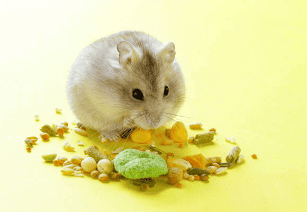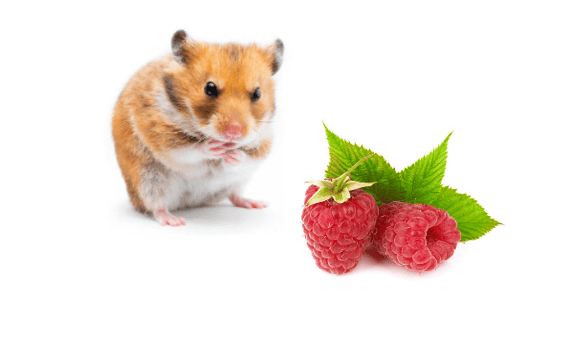Hamsters make delightful pets, and as responsible owners, it’s crucial to understand what they can and cannot eat.
One often-asked question is, “Can hamsters eat raspberries?”
In this comprehensive guide, we’ll delve into the intricacies of feeding raspberries to hamsters, exploring nutritional values, feeding guidelines, potential risks, and more. Let’s ensure your furry friend gets the best care possible.
Table of Contents
Setting the Record Straight: Can Hamsters Have Raspberries?
Wondering if it’s safe to share your favorite berries with your hamster? Let’s clear the air. Can hamsters have raspberries? Absolutely! Raspberries are a healthy addition to your hamster’s diet when given in moderation. However, like any food, there are nuances to consider.
The Nutritional Value of Raspberries
Understanding the nutritional content of raspberries is pivotal in determining whether they make a suitable addition to your hamster’s diet. In this section, we’ll break down the benefits, macronutrients, micronutrients, and risks of feeding raspberries.
Macronutrients in Raspberries
Raspberries are packed with essential macronutrients. These include carbohydrates, proteins, and fats, each contributing to your hamster’s overall well-being. The natural sugars in raspberries provide a quick energy boost, a crucial aspect of a hamster’s diet.
Micronutrients in Raspberries
Beyond macronutrients, raspberries offer a plethora of micronutrients vital for your hamster’s health. Vitamins and minerals, such as vitamin C, potassium, and antioxidants, contribute to a robust immune system and overall vitality.
How Raspberries Can Be Beneficial?
Now, let’s delve into the specific benefits of including raspberries in your hamster’s diet.
Antioxidants and Hamster Health
Raspberries are rich in antioxidants, helping combat free radicals and supporting your hamster’s immune system. A diet with a variety of antioxidants promotes longevity and vitality.
Phytonutrients and Their Importance
The phytonutrients in raspberries play a crucial role in preventing various diseases. These natural compounds contribute to your hamster’s overall well-being and help prevent disease.
Risks Associated with Feeding Raspberries
Before you start serving raspberries to your hamster, it’s essential to be aware of potential risks.
Sugar Content
While natural sugars are beneficial, moderation is key. Excessive sugar intake can lead to health issues, including obesity and diabetes in hamsters. Be mindful of the quantity you offer.
Potential Allergic Reactions
Just like humans, hamsters can have allergies. Monitor your hamster for any adverse reactions, and if in doubt, consult your veterinarian. Now that we understand the nuances let’s move on to feeding guidelines.
Feeding Guidelines for Raspberries
Curious about the right way to introduce raspberries into your hamster’s diet? Let’s explore the recommended portion sizes, frequency of feeding, and proper preparation methods.
How Much Raspberry is Safe?
Ensuring your hamster’s well-being involves not just understanding the nutritional value of raspberries but also knowing the safe limits of consumption. Are raspberries good for hamsters? This critical question also leads us to explore portion size guidelines and feeding frequency.
Portion Size Guidelines
A small portion of raspberries, about the size of your hamster’s cheek pouch, is ample. Remember, moderation is crucial to prevent health issues associated with overeating.
Frequency of Feeding
Offer raspberries as an occasional treat, not a daily staple. Once or twice a week is sufficient to provide the benefits without overloading your hamster’s system.
How to Prepare Raspberries for Your Hamster?
The inquisitive pet owner might also wonder, “Can my hamster eat raspberries?” Beyond the joy of serving these tiny treats, this section explores the nuances of washing, peeling (or not!), and the cutting techniques that ensure your hamster’s safety and satisfaction.
Washing and Peeling

Ensure your raspberries are thoroughly washed to remove pesticides or contaminants. Peeling is optional but can be done if you want to be extra cautious.
Cutting Techniques
Slice raspberries into small, manageable pieces for your hamster. This not only aids in portion control but also reduces the risk of choking.
A Complete Guide to Hamster Nutrition
Understanding a balanced diet is crucial for your hamster’s well-being. Let’s explore the role of macronutrients and micronutrients and the importance of water in their diet. Additionally, we’ll discuss the specific contribution of fruits and vegetables.
Understanding a Balanced Diet for Hamsters
Curious about whether raspberries are good for hamsters in the grand scheme of their nutrition? This section unravels the secrets of a balanced hamster diet, exploring the essential elements that contribute to their overall well-being.
Macronutrients, Micronutrients & Importance of Water
A balanced hamster diet consists of the right proportions of macronutrients like proteins, fats, and carbohydrates. Micronutrients, including vitamins and minerals, play a vital role in various bodily functions. Always ensure access to fresh water for proper hydration.
The Role of Fruits and Vegetables

In the nutritional tapestry of hamster care, understanding the role of fruits and vegetables becomes pivotal. This section not only answers the question of whether “can my hamster eat raspberries” but also delves into the broader significance of incorporating these natural delights into your furry friend’s diet.
Natural Sugars vs. Artificial Sugars
Fruits, including raspberries, offer natural sugars that are a healthier alternative to artificial sugars found in some commercial hamster treats. The natural sweetness enhances the taste without compromising on nutritional value.
Fiber Content
Fruits and vegetables contribute essential fiber to your hamster’s diet, aiding in digestion and preventing constipation. Raspberries, with their fiber content, are a tasty way to promote digestive health.
Interactions with Other Foods or Medical Conditions
Understanding how raspberries interact with other foods and cater to specific medical conditions is crucial for your hamster’s health.
Combining Raspberries with Other Fruits
While raspberries are a delightful treat on their own, combining them with other hamster-safe fruits can create a diverse and interesting diet. Ensure the fruits are cut into small, manageable pieces to prevent choking hazards.
Raspberries and Diabetic Hamsters
If your hamster has diabetes, consult your vet before introducing raspberries. While the natural sugars are generally safe, individual cases may vary.
Raspberries and Obese Hamsters
For hamsters struggling with obesity, raspberries can be a tasty, low-calorie treat. However, always consider the overall diet and consult your vet for personalized advice.
Hamster-Safe Fruits vs. Inappropriate Fruits
Knowing the fruits your hamster can enjoy and those they should avoid is essential. Let’s explore the list of safe fruits and those best left out of your hamster’s diet.
The List of Fruits Safe for Hamsters
- Apple (no seeds)
- Pear
- Banana
- Blueberries
- Strawberries
- Grapes (seedless)
- Melon
- Peach
- Plum
- Mango
- Kiwi
- Blackberries
- Raspberries
- Apricot
- Cherries (pitted)
The Fruits Hamsters Should Avoid
- Citrus Fruits (Lemons, Oranges, Grapefruits)
- Avocado
- Grapes/Raisins (controversial; some say it’s safe, but caution is advised)
- Pineapple
- Pomegranate
- Cherries (with pits)
- Apple Seeds
- Fruit with Pesticide Residue
- Coconut
- Figs
Commercial Hamster Food vs. Natural Food
Let’s weigh the pros and cons of commercial hamster food and natural food to help you make an informed decision about your hamster’s diet.
Pros and Cons of Commercial Food
Commercial hamster food provides a convenient and balanced diet. However, some products may contain additives or preservatives. Always opt for high-quality commercial food to ensure your hamster gets the best nutrition.
| Pros | Cons |
| Balanced Nutrition | Artificial Additives |
| Convenience | Over-Processing |
| Long Shelf-Life | Cost |
| Quality Control | Limited Variety |
| Specialized Formulas | Allergen Risk |
Pros and Cons of Natural Food
Natural foods, like fruits and vegetables, offer variety and additional nutrients. However, it’s crucial to maintain the right balance and not rely solely on natural foods. A combination of both ensures a well-rounded diet.
| Pros | Cons |
| Freshness | Short Shelf-Life |
| No Artificial Additives | Time-Consuming to Prepare |
| Nutrient-Rich | Risk of Contamination |
| Varied Texture and Taste | Nutritional Imbalance |
| Easily Customizable | Seasonal Availability |
Conclusion
In conclusion, raspberries can be a delightful and nutritious addition to your hamster’s diet when offered in moderation. Understanding the nutritional value, feeding guidelines, and potential risks ensures your furry friend stays healthy and happy.
Remember, a balanced diet, proper portion control, and regular vet check-ups are key to your hamster’s well-being.
FAQs
Can All Types of Hamsters Eat Raspberries?
Yes, raspberries are generally safe for all hamster breeds. However, individual sensitivities may vary, so monitor your hamster’s reaction.
Can Hamsters Eat Dried or Frozen Raspberries?
Fresh raspberries are preferable, but occasionally, offering small amounts of unsweetened frozen raspberries is acceptable. Avoid sugary or dried variants.
What About Raspberry Leaves?
Raspberry leaves are safe for hamsters and can be offered in small amounts. However, focus on the actual berries for nutritional benefits.
What is the best way to wash raspberries for hamsters?
Rinse raspberries thoroughly under running water to remove any pesticides or contaminants.
What are some of the most creative ways to feed raspberries to hamsters?
Thread raspberry pieces onto a skewer for a fun and engaging treat. Always ensure the pieces are bite-sized to prevent choking.
Alina Hartley is a small-town girl with a ginormous love of bearded dragons. It all started with Winchester, a baby bearded who was abandoned at the shelter by his former owners because of a birth defect that caused one front leg to be shorter than the other. Alina originally went to the shelter looking for a guinea pig, but one look at Winchester and it was love at first sight. From that day on, Alina has dedicated her life to learning everything she can about bearded dragons. She loves helping new beardie parents start their incredible journey with these magnificent reptiles.
Follow her on:
LINKEDIN
TWITTER.
Read her latest articles HERE
Learn more about her HERE.

